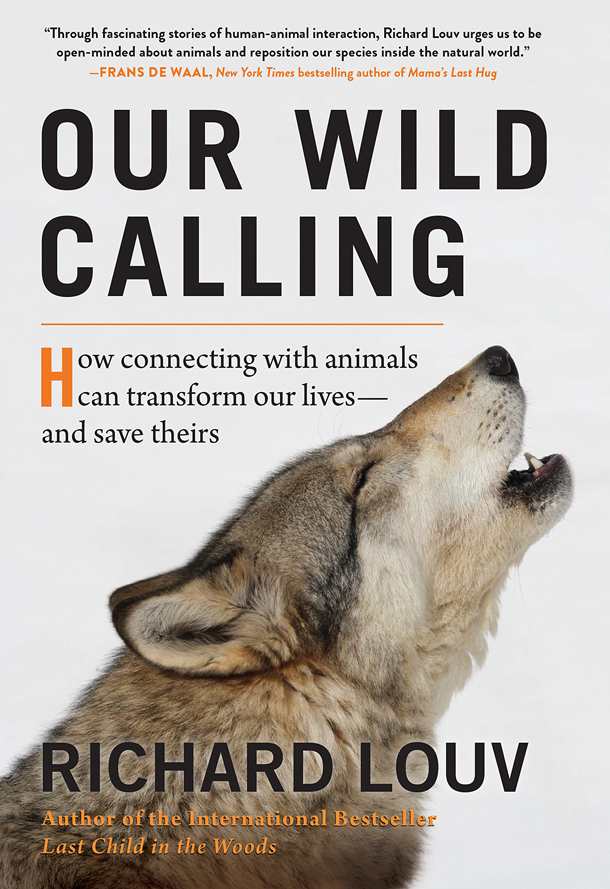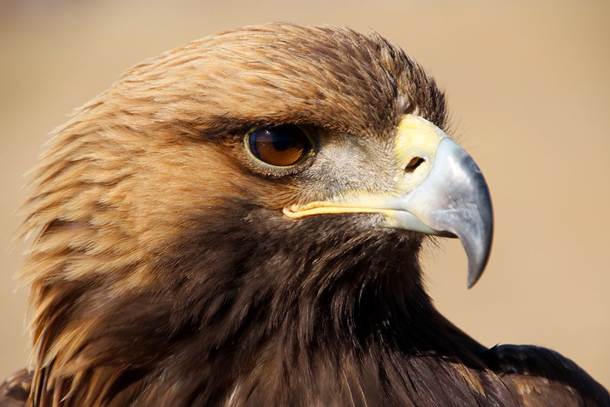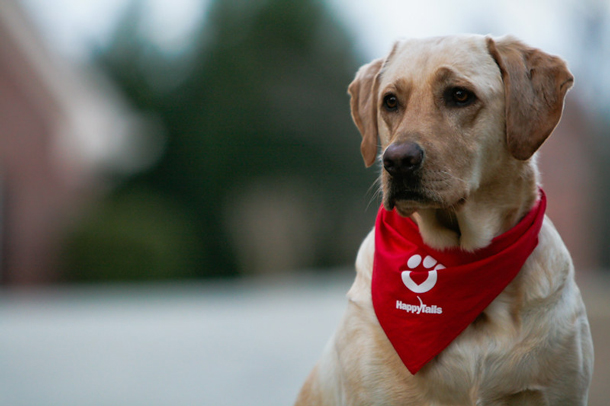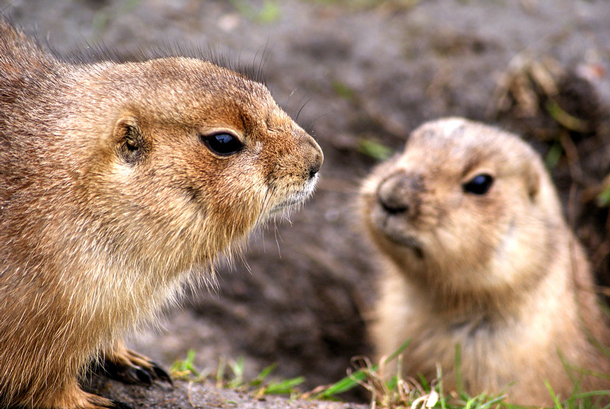Our Wild Calling
Air Date: Week of January 31, 2020

Our Wild Calling spans a wide array of human and animal interactions, including zoos and robotic dogs. (Photo: Courtesy of Richard Louv)
Our modern lives have separated us from other species and contributed to what author Richard Louv calls “species loneliness”. In his book, Our Wild Calling: How Connecting with Animals Can Transform Our Lives – and Save Theirs, Louv shares stories about meaningful interactions between humans and other species and makes the case for their value. Richard Louv joins Living on Earth’s Steve Curwood to discuss how relationships with wildlife can reveal new levels in our humanity.
Transcript
BASCOMB: It’s Living on Earth, I’m Bobby Bascomb.
Many pet owners will tell you that they have a profound relationship with their animals.
Dogs are man's best friend, after all, and cats can be aloof yet beloved housemates.
But even as many of us live with pets, modern life often alienates us from animals in the natural world. In his new book, Our Wild Calling, Richard Louv explores that disconnect and the moments that can feel magical when we do make a meaningful connection with wildlife. Author Richard Louv spoke with Living on Earth’s Steve Curwood.
CURWOOD: So after writing a book that centers on them, why do you think it's important that we examine the relationships between humans and animals? I mean, what do all species stand to gain when we think about, when we reflect on these relationships and, and what's at stake if we don't?
LOUV: That's a great way to put it, what do all species stand to gain. This is not only about us and what we stand to gain in terms of mental health and even physical health and spiritual health, but also the preservation of these species that are all around us. In the book, I have something I call the reciprocity principle, which we'll talk about later. What we have to gain I think most of all, right now, at least in the current society, there's an epidemic of human loneliness that medical folks are talking about. And they're saying that human loneliness, isolation, may soon surpass obesity as a cause of early death. That's a remarkable thing. And it's not just because of suicide, it's because of all the diseases that are associated with human loneliness. I make the case in Our Wild Calling that human loneliness is rooted in an even deeper loneliness, which is species loneliness. We are, for example, urban parks that have the best psychological impact on human beings, studies show, are the parks that happen to have the highest biodiversity. I don't think that's an accident. I think we are desperate to feel not alone in the universe. Why else would we look for Bigfoot, you know, or intelligent life on other planets when that may not be a good idea to find? We really don't want to be alone in the universe.
CURWOOD: Richard, your book is threaded together by some really wonderful examples of meaningful moments shared between humans and animals. Talk to me about an encounter you've had and what made it stand out for you.
LOUV: One example of a story that I tell in the book is I was on a lake once, near San Diego, and I have a little electric motor on my boat. And I saw on the shore what I thought were two vultures. And I eased up with my electric motor and got within about 20 feet and they were not vultures. They were two really big golden eagles. And they were eating a dead carp on the shore. And you don't usually get within 20 feet of golden eagles. And they stayed there. I stayed there. One of them flew away for a minute, went up to a peak and then came back. And then for what seemed forever, they would dip down, take a bite of the fish and then look back up at me straight into my eyes. Their eyes actually never left my eyes up and down, up and down as they ate. I felt, and I know this sounds New Agey, but I felt something shift there between me and the eagles. And it was the same thing that I heard later from person after person who told me similar stories. So I went home. I talked to my younger son Matthew who was home from college, and I said 'Matthew, this thing happened. And I, you know, I can't really explain it but whatever, whoever I say I am, I'm not. Whoever I was in those moments is actually who I am.' I don't have the words to explain this. This is, I think beyond human language. I have some theories about what, what that is. But that's similar to what I heard time after time, including from hardcore scientists who would, wouldn't get close to anything that smacked of anthropomorphism.

Richard Louv has felt a special connection with many wild animals, including a pair of golden eagles he saw on the shore of a lake. (Photo: carfull, Flickr CC BY-NC-ND 2.0)
CURWOOD: It can be so hard to find the right language to capture those experiences, those, those relationships. In fact, in your book, you mentioned, one of the impulses that these encounters spark is the urge to describe them as being some kind of magic. How does this word affect people and what do you think of that?
LOUV: Well, that's a troubling word. We tend to shy away from that, but we have to find some words for this. One of the ways to describe this is there's a great philosopher named Martin Buber, who wrote a great essay called I and Thou. It was about you and me. It was about human relations. And he said that you and I don't actually exist. What exists is between us. It's the relationship, he thought of it as a kind of electricity that some people call God. And I apply that really to the experiences and relationships we have with other animals, whether they're our dog or a bobcat walking through our backyard, it stops and looks at us, or those eagles on the shore. What is that thing between us? What is that that happens? So in Our Wild Calling, I decided to name that and I call that the habitat of the heart. And I believe that there are two habitats. One is the physical habitat that we spend a lot of time and money trying to protect, and we do, as we should. And then there's this other habitat, the habitat of the heart, and we spend hardly any time and hardly any money trying to preserve that or explore it, or nurture it. But here's the deal, if one of those habitats goes, so does the other one.
CURWOOD: Talk to me about reciprocity, why that's important to understand.
LOUV: Well, I came to the conclusion, this is at the end of the book. And if you don't mind, I'd like to read a few sentences that describe it, because I, I'm better at reading those that I am describing it. Basically it builds on the values that we already recognize in terms of the exploitation ethic that obviously takes from nature and then there's the nurturing ethic that gives back or gives to nature, but what I talk about in terms of reciprocity is that it goes both ways. We really need to focus on that in our individual lives, but also in our public lives. So I think the times call for an adoption of this basic principle that embraces both survival and joy and we need that to repair our relationship with the natural world. The reciprocity principle as I describe it, is for every moment of healing that humans receive from another creature, humans will provide an equal moment of healing for that animal and its kin. For every acre of wild habitat we take, we will preserve or create at least another acre for wildness. For every dollar we spend on classroom technology, we will spend at least another dollar creating chances for children to connect deeply with another animal, plant or person. For every day of loneliness we endure, we'll spend a day in communion with the life around us until the loneliness passes away.
CURWOOD: Let's jump ahead to a moment, to domesticated animals, and I'm thinking particularly of therapy animals that frankly, they've gotten kind of negative attention over the last few years. What's this famous example of a, of a woman who tried to bring her therapy peacock onto a plane?

Dogs have a way of connecting with humans, honed over thousands of years, that makes them great service animals as well as therapy dogs. (Photo: Marvin Kuo, CC BY 2.0)
LOUV: You know, I talk about that in the book. I spend at least two chapters in there talking about the rise of animal assisted therapy. Now there's two brands of this. One is the kinds of dogs that are trained to do this, formal training service dogs, but also formal training of therapists who use animals in the therapy, for instance, equine therapy, horse therapy. Then there's this other kind, which is growing even faster. Both of these are growing. The other kind is the companion animal. A young woman who is on the autism spectrum, who also has an additional condition, a kind of schizophrenia that was only discovered recently and I think she's 22 or 23. She and her mother came up to Julian, we sat in the coffee shop and talked for a long time with their dog, Kobo. Kobo is not only sensitive and has been trained on the autism symptoms. He's taught himself about the schizophrenia symptoms. One of the things he does is he, he gets on her lap, slowly pushes her to the floor with his weight, big dog, and holds her down as much as he can. You know how a cat can become heavier when it wants to be? Kobo does that. And it turns out when Kobo is in danger, this young woman does the same thing with Kobo. She's learned from Kobo to calm Kobo, so it's reciprocal. I found that very moving. And you know, she told me she can, we were sitting there at the table in the cafe she says that, you know, she can kind of read Kobo's mind as well as he can read hers. And I said, 'Okay, well, what's Kobo thinking right now?' She said, 'he says he's kind of bored.' That animal assisted therapy of both of those kinds is growing very rapidly. There's a professor at the University of Denver, who's an expert on this, he told me he thinks is this is one of the fastest growing types of therapy in our culture. And there are good reasons for that. And there are good reasons also to be careful with that.
CURWOOD: So there are moments when we immerse ourselves in the natural world to connect with animals. But increasingly, there are also times that we're now using technology to do this connection, right? I mean, you write about an attempt to use artificial intelligence to translate prairie dog calls into a human language and then back again so that we can have a two-way conversation with them.
LOUV: That's a, that's a scientist, his name I can never pronounce but it's Con Slobodchikoff, but he's doing fascinating work with prairie dogs.
CURWOOD: Yeah, but what could we lose by putting this conversation with prairie dogs into our terms?
LOUV: Well, I do write about this with some skepticism. Even so, it's pretty fascinating. He's been recording prairie dog language sounds for quite a while and then moving them through a computer and decoding them. Prairie dogs of all the animals that have been studied in terms of their sounds and signals have been studied more than any other animals, according to him. And he believes it's possible that we will be able to feed those sounds into a computer that translates them into another sound in English or whatever, French, whatever languages that we use. And vice versa. We'll be able to speak into a computer and have that deliver that message to prairie dogs in their language. And their languages is really pretty amazing. They're like really good journalists and they don't do fake news. There's a prairie dog that stands at the edge of the prairie dog town. If he sees a guy approaching with a white shirt, and dark pants, he could report that in that kind of detail. He lets the others know and they pass it on down through until the whole town knows. Amazing amount of detail and complexity in that language. Now, should we do that? Do we need to do that? Probably one of the most extreme examples, and I think it's kind of ridiculous, is there are some researchers are working on a special leash attached to a special vest on your dog that will tell you what your dog is thinking or smelling or feeling. And I think that's pretty strange because we've had at least 30,000 years at coevolution. And like the young woman with autism spectrum, we pretty much know what they're saying. And they pretty much know what we're saying.
CURWOOD: There are many, many, many stories written usually for children, in which animals talk. Why is that so important? To tell stories of animals speaking? It's also by the way, in indigenous cultures, if you listen to their stories, not just for kids, but for everyone, the animals are speaking either literally with words or, you know, with their body language symbolically. Why do we need animals to talk to us?

Prairie dogs communicate using a remarkably complex language (Photo: Pixel.la, Flickr Public Domain)
LOUV: I think one of the messages I hope this book, Our Wild Calling, is that we need to tell stories. We need to tell about that. I asked the famous wildlife artist Robert Bateman in Canada once, when I walked into his center his, where he has all of his art displayed that I helped open for him. I saw his artwork for the first time. His giant bear was, I thought, stepping out of the picture. I saw it. I said, Bob, how do you do that? He said, I become the bear. Now when we tell stories, I told stories to my kids using stuffed animals. Who hasn't who has kids? And they took on their own personalities. My sons gave them their personality. We have Chico, who's a sock monkey, who's really kind of a nasty little guy. Yeah. And they tell each, and then the stuffed animals tell each other stories. And my sons would act out things, talk out things that they felt funny about bringing out verbally as their own voice, but they came out through Chico. That's one of the reasons why it's important to tell these animals stories. One things I found is that in there, there are probably about 100 of these stories that people told me in the book. One of the things that I found is that some of them had never told that story before because they're embarrassed. But once they tell it, they find even more meaning in that story than they did to begin with. The more they tell it the more meaning, now that's very old. That's the in us. That's part of who we are, part of our humanity. It's one of the reasons why I'd love for people who read this book to sit around the dining room table and tell some animal stories to each other as families. At least two people I've heard from recently have told me they're reading the book to their kids, when I'm actually next to a fireplace, and they're telling animal stories. These stories have great meaning. It doesn't really matter to me whether that meaning is intrinsic in some fashion of magic, or whether we project that meaning into that, you know, not taking away the animal soul, but giving ourselves a deeper soul by telling that story.
BASCOMB: That’s author Richard Louv speaking with Living on Earth’s Steve Curwood about his new book, Our Wild Calling.
Links
Living on Earth wants to hear from you!
Living on Earth
62 Calef Highway, Suite 212
Lee, NH 03861
Telephone: 617-287-4121
E-mail: comments@loe.org
Newsletter [Click here]
Donate to Living on Earth!
Living on Earth is an independent media program and relies entirely on contributions from listeners and institutions supporting public service. Please donate now to preserve an independent environmental voice.
NewsletterLiving on Earth offers a weekly delivery of the show's rundown to your mailbox. Sign up for our newsletter today!
 Sailors For The Sea: Be the change you want to sea.
Sailors For The Sea: Be the change you want to sea.
 The Grantham Foundation for the Protection of the Environment: Committed to protecting and improving the health of the global environment.
The Grantham Foundation for the Protection of the Environment: Committed to protecting and improving the health of the global environment.
 Contribute to Living on Earth and receive, as our gift to you, an archival print of one of Mark Seth Lender's extraordinary wildlife photographs. Follow the link to see Mark's current collection of photographs.
Contribute to Living on Earth and receive, as our gift to you, an archival print of one of Mark Seth Lender's extraordinary wildlife photographs. Follow the link to see Mark's current collection of photographs.
 Buy a signed copy of Mark Seth Lender's book Smeagull the Seagull & support Living on Earth
Buy a signed copy of Mark Seth Lender's book Smeagull the Seagull & support Living on Earth

